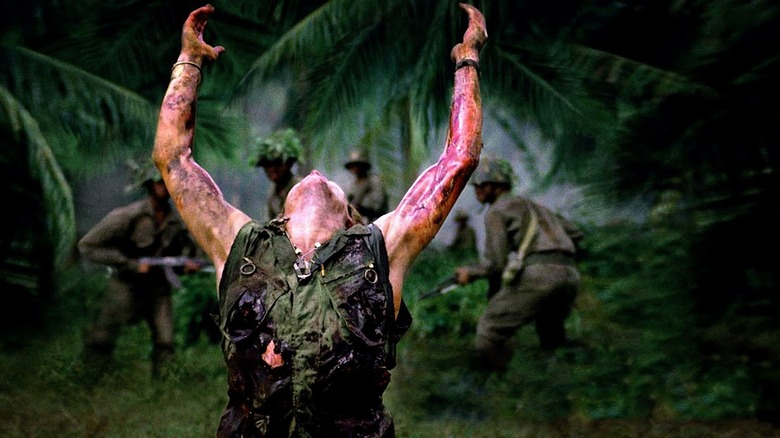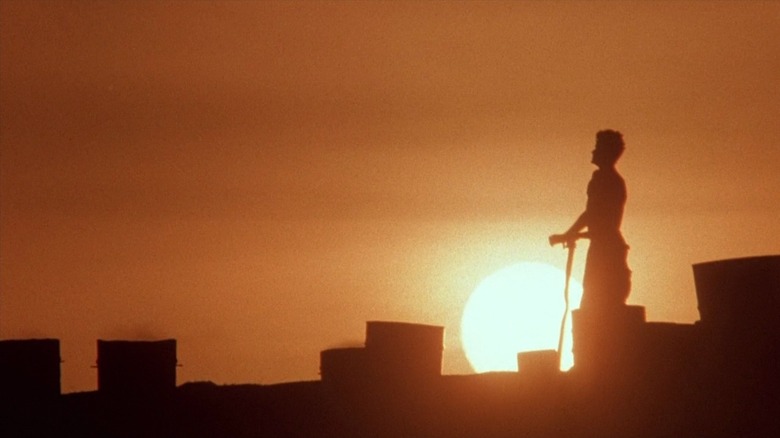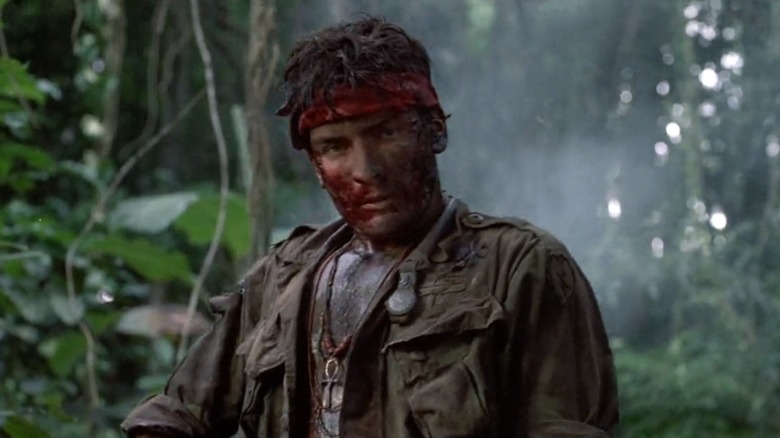Platoon Ending Explained: A Mad Swirl Of Destruction
In 1986, director Oliver Stone pulverized moviegoers with his landmark Vietnam War drama, "Platoon." Released just eleven years after the fall of Saigon, the Best Picture-winner stars Charlie Sheen as Chris Taylor, an idealistic young U.S. Army volunteer who finds himself caught in an internecine, life-or-death struggle between the humane Sergeant Elias (Willem Dafoe) and the homicidal Staff Sergeant Barnes (Tom Berenger).
It's a brutally realistic depiction of a conflict that made little sense to the soldiers thrust into it, all of which is sagely summarized in Taylor's narrated letters home to his grandmother. These voiceovers are the key to understanding the movie, which climaxes with the platoon's captain ordering a stunningly chaotic air raid on his company's overrun position. It's a mad swirl of destruction punctuated by Taylor's execution of a badly wounded Barnes. How did it come to this, and what does this wanton death and destruction mean?
Taylor's Crucible
Early in the film, Taylor tells his grandmother that he is in Hell. He quotes an uncited writer who once described the underworld as a locale governed by "the impossibility of reason." Though he finds solace in Elias's marijuana-laced wisdom, he is equally galled by Barnes' abject cruelty and dedication to "the machine." Both sergeants follow their orders, but Elias does so ruefully. Elias confesses to Taylor that Vietnam is a losing campaign. "We been kicking other peoples asses so long, I figure it's time we got ours kicked." Barnes is a true believer in the process. He relishes a fight, and he detests Elias' pot use. "I am reality," he boasts.
Barnes' hatred extends to the people he's charged with defending. When the platoon, smarting from a sneak attack that killed three of its members, discovers a stash of weaponry in an otherwise peaceful village, Barnes executes the wife of the community's leader out of sheer, reasonless fury. The platoon burns the village to the ground. Myriad war crimes are committed. An investigation is in the offing, and Barnes is determined to thwart it.
A Rain of Hellfire
Well aware that Elias will testify against him in a court martial, Barnes mortally wounds his bête noire during a ferocious firefight (Elias's valiant, Christ-like charge back to the evac spot is the film's poster image). But the only way he'll be clear of a court martial is to kill Taylor. In the midst of a savage final battle, Barnes turns his attention away from the enemy to target Taylor. He's about to murder our protagonist when the aerial ordnance blasts the entire location to hell. When the smoke clears, Taylor rises from his scorched stupor, happens upon Barnes and does the only reasonable thing: he kills the war-addled monster.
As Taylor is flown out of the decimated area, he writes one last letter to his grandmother. "I think now, looking back, we did not fight the enemy. We fought ourselves. And the enemy is in us." In this moment, Stone captured the contentiousness of the Vietnam era and predicted the reason-free Hell to come.


